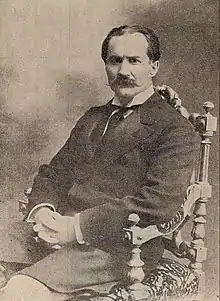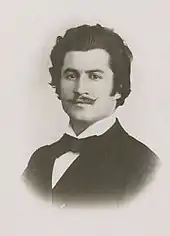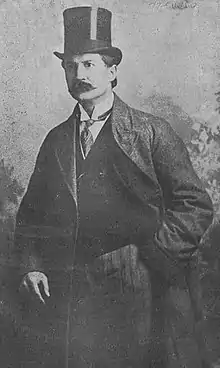Rıza Tevfik (Bölükbaşı) | |
|---|---|
 Rıza Tevfik in 1910 | |
| Personal details | |
| Born | 1869 Mustafapaşa, Ottoman Empire now Svilengrad, Bulgaria |
| Died | 31 December 1949 Istanbul, Turkey |
| Occupation | Politician |
Rıza Tevfik Bey (Rıza Tevfik Bölükbaşı after the Turkish Surname Law of 1934; 1869 – 31 December 1949) was an Ottoman and later Turkish philosopher, poet, politician of liberal signature[1] and a community leader (for some members among the Bektashi community) of the late-19th-century and early-20th-century. A polyglot,[2] he is most remembered in Turkey for being one of the four Ottoman signatories of the disastrous Treaty of Sèvres, for which reason he was included in 1923 among the 150 personae non gratae of Turkey, and he spent 20 years in exile until he was given amnesty by Turkey in 1943.
Early life and career


Rıza Tevfik was born in 1869 in Mustafapaşa, today Svilengrad in Bulgaria, to an Albanian father originally from Dibra[3] and Circassian mother,[4][5][6] who died when he was young.[3] He had a brother Besim, who would later commit suicide in Edirne.[7] Placed in a Jewish school in Constantinople by his father, who was a prefect, Rıza Tevfik learned Spanish and French at an early age. He was remarked as a restless personality during his student years, first in the famed Galatasaray High School, and then in the Imperial School of Medicine (Tıbbiye), and he was arrested and incarcerated several times, not falling short of inciting fellow inmates to revolt during his prison months. He could graduate at the age thirty and became a doctor. In 1907, he joined the Committee of Union and Progress (CUP), and was one of that party's deputies for Edirne[7] in the Chamber of Deputies (the popularly elected lower house of the re-established Ottoman Parliament) of 1908. He split with the CUP in 1911, joining for a short while the newly founded opposition Freedom and Accord Party (Liberal Entente),[2] and was vehemently opposed to its entry of the Ottoman Empire into World War I.
Political career in the Ottoman Empire

Rıza Tevfik was named the Minister of Education of the Ottoman Empire (Turkish: Maarif Nazırı) in several cabinets (11 November 1918 – 12 January 1919)[2] formed after the fall of the CUP and the Ottoman Empire's defeat in World War I. He was also appointed to the Senate (the upper house of the Ottoman Parliament) by the sultan, of which he became President twice (24 May – 18 June 1919 and 31 July – 21 October 1920).
He was one of the four signatories of the stillborn Treaty of Sèvres, being included in the delegation to the Paris Peace Conference by the grand vizier Damat Ferid Pasha, although he occupied no official position at the time of the negotiations, simply being a professor in Istanbul University. Since he was one of the signatories of the abortive treaty, he was included in the 150 persona non grata of Turkey after the Turkish victory in the Turkish War of Independence, and he had to leave Turkey in late 1922.
Exile, return to Turkey, and death
Rıza Tevfik lived in the United States, Cyprus, Hejaz, Jordan (where he was made the director of the National Museum and Library in 1925), and Lebanon during the following 20 years, until he could return to Turkey in the frame of a 1943 amnesty.[2] He adopted the last name Bölükbaşı after the 1934 Surname Law. In the meantime, he had had his collection of poetry published in Nicosia.
He resumed work as a university professor in Istanbul until his death on 31 December 1949.[2] Aside from his poetry and his articles on philosophy, he is also notable for his translations into Turkish for most of the poems of Omar Khayyam.
References
Notes
- ↑ Markham, Ian S.; Sayilgan, Zeyneb (2017). The Companion to Said Nursi Studies. Pickwick Publications. ISBN 978-1-4982-9222-1.
- 1 2 3 4 5 Özoğlu, Hakan (24 June 2011). From Caliphate to Secular State: Power Struggle in the Early Turkish Republic: Power Struggle in the Early Turkish Republic. ABC-CLIO. p. 48. ISBN 978-0-313-37957-4.
- 1 2 Bahanur Garan (2013), TANZİMAT'TAN CUMHURİYET'E TÜRK ŞİİRİNDE BALKANLAR [THE BALKANS IN THE TURKISH POETRY FROM TANZIMAT TO THE REPUBLIC] (PDF) (in Turkish), Ancara: Hacettepe University Institute of Social Sciences,
Rıza Tevfik, babasının görevi üzerine bulunduğu Edirne vilayetine bağlı Cisr-i Mustafapaşa (Tsaribrob) kazasında dünyaya gelir. Babası Gega denilen şimal Arnavutlarından olan Hoca Mehmet Tevfik Efendi, dedesi ise Debre-i Ahmet Durmuş Bölükbaşı. ..."Rıza Tevfik‟in şiire karşı ciddi şekilde asıl ilgisi, henüz küçük yaşta annesinin ölümü üzerine ailesiyle birlikte gelip yerleştikleri Gelibolu‟da uyanır.
[Rıza Tevfik was born in Cisr-i Mustafapaşa (Tsaribrob), in Edirne province, where his father was assigned. His father's name is Hoca Mehmet Tevfik Efendi, who is an Albanian, and his grandfather is Debre-i Ahmet Durmuş Bölükbaşı. ...His serious interest in poetry awakens in Gallipoli, where he and his family settled upon the death of his mother at an early age.] - ↑ Rıza Tevfik (1950). Bütün cepheleriyle Rıza Tevfik: şiirler, makaleler, hatıralar. Halk Basımevi. p. 8.
Rıza Tevfik'in Hayatı ve Eserleri 1868 yılında Rumelinin Mustafapaşa köprüsünde doğan Bm Tevfik Bölükbaşı, baba cihetile Arnavut, ana cihetile Çerkeş olup bu ciheti şu beytiyle açıklamıştır: Babam Arnavuddu, anam Çerkeş Bilmiyen varsa...
- ↑ Hilmi Yücebaş; Rıza Tevfik (1958). Filozof Rıza Tevfik: hayatı, şiirleri, hâtıraları. p. 6.
...1868 yılında Rumelinin Cisr-i Mustafa paşa (Tsaribrod) kasabasında doğan Rıza Tevfik Bölükbaşı. baba cihetiyle Arnavut, ..
- ↑ Refik Ahmet Sevengil (1968). Türk tiyatrosu tarihi: Neşrutiyettiyatrosu. Maarif Basımevi. p. 8.
...sonraları tanınmış şair Rıza Tevfik Bölükbaşı (Arnavut ve göçmen)..
- 1 2 Süssheim, Karl (2002). The Diary of Karl Süssheim (1878-1947): Orientalist Between Munich and Istanbul. Franz Steiner Verlag. p. 56. ISBN 978-3-515-07573-2.
Sources
- Feylesof Riza (S.T. Wasti) Middle Eastern Studies, April 2002